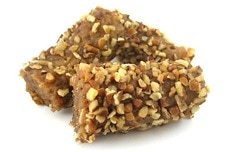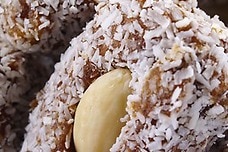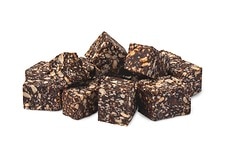Benefits of Dates
Dates have been enjoyed for thousands of years in the Middle East. They were first introduced to the United States when the U.S. Department of Agriculture created a special corps of men called the Agricultural Explorers in 1898 (National Public Radio, 2014). These Agricultural Explorers circled the globe to find new food crops. When they stumbled upon the date palm, they realized that dates would grow well in the hot climate of California and the American Southwest.
Since that time, dates have become a beloved food in the United States and around the world. In addition to being a naturally sweet treat, dates can be incredibly beneficial for your health. Consider some of the following benefits of eating dates.
Dates are Naturally Sweet
Anyone who has eaten a plump, moist date knows that sweet flavor almost explodes upon your tongue after taking a bite. The natural sweetness of dates comes from a high concentration of fructose, a disaccharide that makes many fruits taste sweet (American Heart Association, 2016). Unlike glucose, the type of sugar found in many processed foods, fructose does not significantly affect blood sugar levels. Thus, eating dates is a good way to enjoy a sweet treat without many of the negative health effects of consuming added sugars (American Heart Association, 2016).
Dates are a Good Source of Fiber
Each date provides 1.6 grams of dietary fiber (Self Nutrition Data, 2015). Men should aim to get 38 grams of fiber every day, while women need at least 25 grams (Mayo Clinic, 2015). Eating a small handful of dates (six or seven whole dates) gives you 11.2 grams of dietary fiber, putting you well on your way to your recommended daily intake.
Getting enough dietary fiber is associated with better cardiovascular health, lower levels of “bad” LDL cholesterol, improved gastrointestinal regularity, better control of blood sugar, and maintenance of a healthy weight (Mayo Clinic, 2015).
Dates are a Versatile Food
The versatility of dates is one of their biggest advantages. Dates make the perfect mid-afternoon snack, providing an energy boost when you feel sluggish. However, they are also sweet enough to enjoy for dessert. Try eating dates plain, making oatmeal date bars, adding dates to a pork dish for a hint of sweetness, or blending dates into a smoothie for a rich, creamy final product. Finely chopped or pureed dates can also be swapped for table sugar in many dessert recipes.
Eating Dates Is an Excellent Way to Boost Your Potassium Levels
Potassium is a dietary mineral, needed in trace amounts to support a variety of physiological processes. One of the most important roles for potassium in the human body that it acts as an electrolyte (Lin, 2010). Thus, eating dates can be a good way to replenish your electrolyte levels after engaging in a strenuous workout.
Potassium is also necessary for maintenance of the membrane potential of neurons, allowing your neurons to communicate with one another. Furthermore, getting enough potassium has been associated with lower risk of stroke, osteoporosis, high blood pressure, and kidney stones (Lin, 2010). Each date you eat contains 167 milligrams of potassium, approximately 5% of your recommended daily intake (Self Nutrition Data, 2015).
Dates Contain Beneficial Antioxidants
Dates are a great source of vitamins A and K, which act as antioxidants in the body. Antioxidants are compounds that reduce the amount of oxidative damage in the cell. Accumulating too much oxidative damage can harm the DNA of the cell, providing a possible mechanism for cancer formation (Reuter, Gupta, Chaturvedi, & Aggarwal, 2010). One of the most beneficial compounds in dates is tannins, a type of polyphenolic antioxidants. Tannins can reduce inflammation and boost your immune system functioning. Meanwhile, vitamin K is essential for the blood coagulation response. Together, these vitamins and antioxidants support cellular health.
Dates are a Good Source of the Trace Mineral Selenium
Our bodies rely on dozens of trace minerals that can only be acquired through the foods we eat. One of these, selenium, is needed in small amounts- with adults needing 55 micrograms per day (Tsuji, 2015). Perhaps the most important role of selenium is to form part of an amino acid required to create proteins used for enzymatic reactions. Selenium deficiency is associated with higher physiological stress that can, in turn, impair tissue health.
In several large-scale scientific studies, getting enough selenium has been associated with lower risk of bladder cancer and prostate cancer (Tsuji, 2015). Increasing your selenium consumption may also reduce risk of cardiovascular disease and immune system problems. Although dates contain small amounts of selenium, your body only uses trace amounts of this mineral to support health. Thus, a handful of dates every day is enough to reap the benefits of this essential mineral.
Date-Based Recipes
The following recipes provide creative ways to use these nutritious fruits to sweeten a superbly delicious dish.
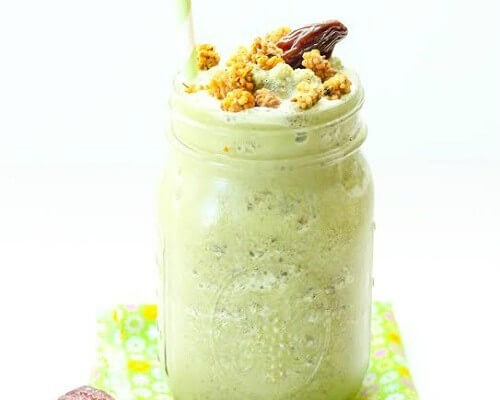
Matcha Green Tea Smoothie Recipe {gluten-free, vegan}
For fans of matcha, this superb smoothie features the unique savor of the tea with natural sources of sweetness. The result is a nutritious beverage that can be enjoyed as a quick breakfast or afternoon pick-me-up.
Ingredients: Almond milk, matcha green tea powder, hemp protein powder, almond flour, dried mulberries, pitted dates, flaxseed meal, ice cubes, stevia powder.
Total Time: 5 minutes
| Yield: 4 smoothies
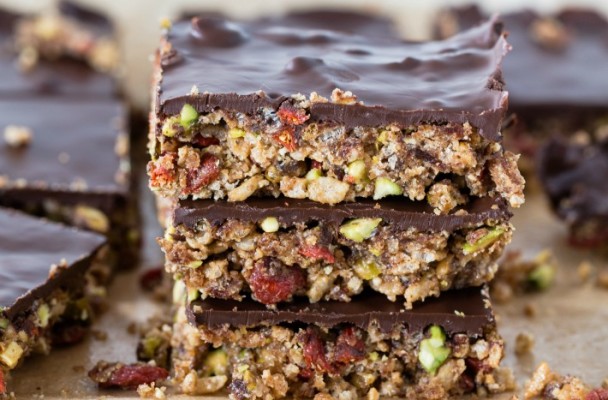
Chocolate Goji Berry Bars Recipe {gluten-free}
These invigorating energy bars include superfoods like goji berries and quinoa while supplying a smooth and rich taste with the tantalizing tastes of dates and dark chocolate. Enjoy them as a midafternoon snack to stay alert, focused and satisfied.
Ingredients: Pitted dates, almond butter, quinoa puffs, goji berries, raw pistachios, coconut oil, dark chocolate chips.
Total Time: 20 minutes
| Yield: 8 bars

No-Bake Cheesecake Bites Recipe {gluten-free}
This simple dessert offers a natural treat full of fall flavors with a delectable base sweetened by vanilla and dates. The clever confection can also be made entirely without the use of your oven for a bake-free bite that’s ready in minutes.
Ingredients: Pitted dates, almond flour, cacao powder, vanilla extract, almond milk, raw cashews, maple syrup, canned pumpkin, pumpkin spice.
Total Time: 20 minutes
| Yield: 16 - 20 squares
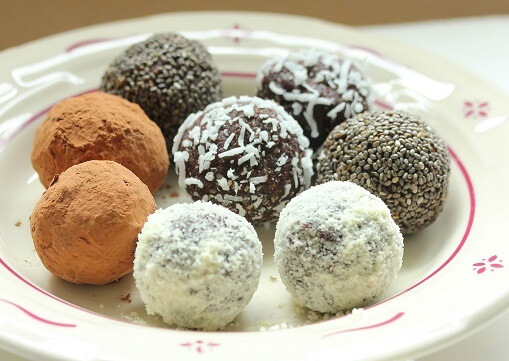
Healthy Vegan Chocolate Truffle Recipe
Trade your traditional truffles for these healthy, vegan alternatives. Dates compose the base of these tasty treats and a clever assortment of coconut and cacao coat the outer layers to supply a sweet savor that is supremely satisfying.
Ingredients: Jumbo Mejdool dates, almond flour, chia seeds, flaxseed meal, cacao powder, agave or maple syrup, almond milk, unsweetened shredded coconut.
Total Time: 15 minutes
| Yield: 24 truffles
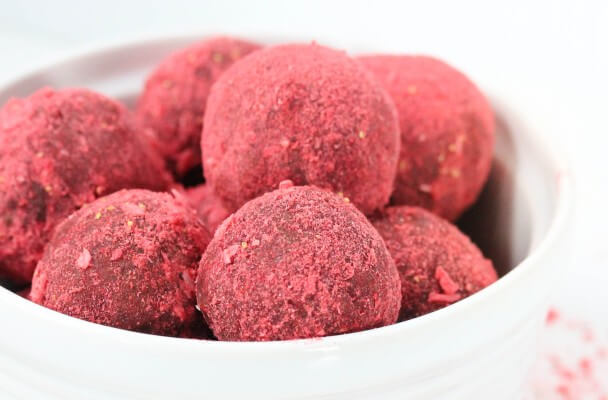
Almond Truffles Recipe {gluten-free, vegan}
For those that prefer a more tart treat, this variation on our vegan truffles pairs the redolent relish of raspberry with soft undertones of almond. As with our other truffles, the natural source of sweetness from dates creates a healthy alternative to standard dessert fare.
Ingredients: Pitted dates, almond flour, almond butter, water, flaxseed meal, freeze-dried raspberries, unsweetened shredded coconut.
Total Time: 15 minutes
| Yield: 14 - 16 truffles
Dates and Date-Based Snacks
We carry several variety of dates and have used the palatable palms to create a wide variety of sweet snacks. While you can find a full list of our date products here, you can discover some of our favorite date treats below.
Healthy Eating
- Healthy Snacks
- Healthy Meals
- Healthy Recipes
- Sports Nutrition
- Nutrition and Special Diets
- 21 Day Fix
- 5 Popular Diet Similarities
- Alkaline Diet
- Anti-Inflammatory Diet
- Calorie Counting
- Carb Cycling Diet
- Celiac Disease
- Cholesterol
- Clean Eating
- Crohn's Disease
- DASH Diet
- Detox Diet
- Diabetes
- Diabetes Diet
- Diet Pill Dangers
- Fat Burning Foods
- Gluten-free Diet
- Glycemic Index
- Heart Health
- High Blood Pressure Diet
- High Fiber Foods
- How to Eat Healthy
- How to Lower Blood Pressure
- Hypertension
- IBS Diet
- Ketogenic Diet
- Liquid Diet
- Low GI Foods
- Low-Carb Diet and Foods
- Low-Fat High-Carb Diet
- Mediterranean Diet
- Mediterranean Diet Foods
- Military Diet
- Nutrition Labels Explained
- Paleo Diet
- Raw Food Diet
- Superfoods
- Sustainable Weight Loss
- Thrive Diet
- Vegan Diet
- Vegetarian Diet
- Weight Loss Shakes
- Whole30
- Vitamins, Minerals & Nutrients

